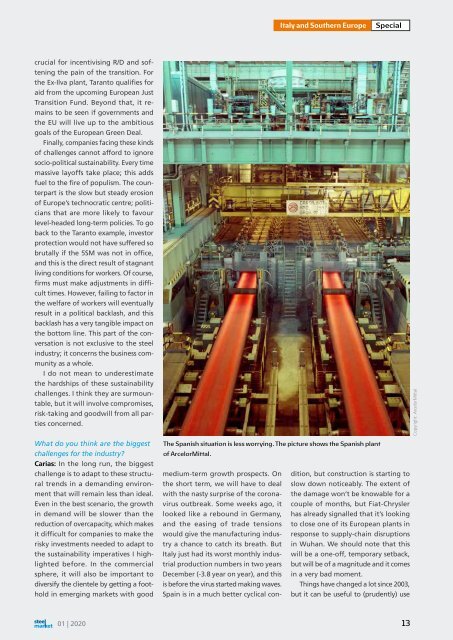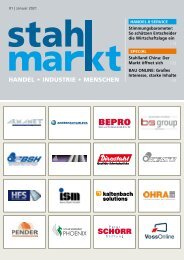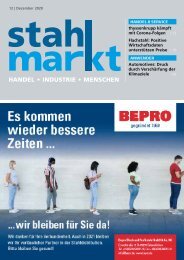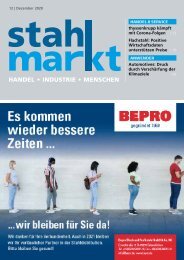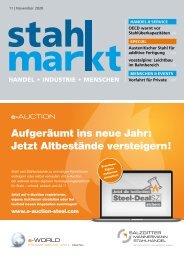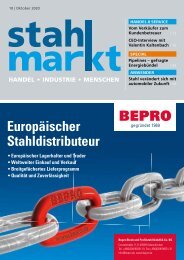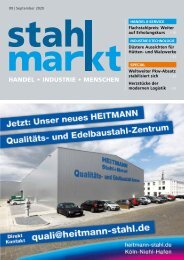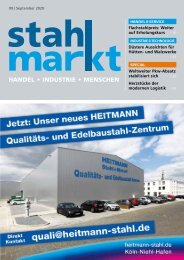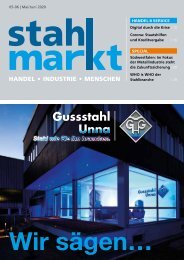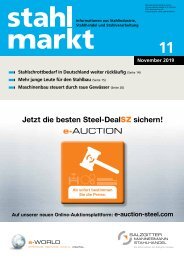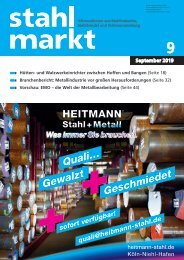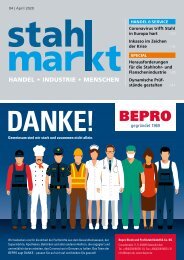Steel Market 01 / 2020
Create successful ePaper yourself
Turn your PDF publications into a flip-book with our unique Google optimized e-Paper software.
Italy and Southern Europe<br />
Special<br />
crucial for incentivising R/D and softening<br />
the pain of the transition. For<br />
the Ex-Ilva plant, Taranto qualifies for<br />
aid from the upcoming European Just<br />
Transition Fund. Beyond that, it remains<br />
to be seen if governments and<br />
the EU will live up to the ambitious<br />
goals of the European Green Deal.<br />
Finally, companies facing these kinds<br />
of challenges cannot afford to ignore<br />
socio-political sustainability. Every time<br />
massive layoffs take place; this adds<br />
fuel to the fire of populism. The counterpart<br />
is the slow but steady erosion<br />
of Europe’s technocratic centre; politicians<br />
that are more likely to favour<br />
level-headed long-term policies. To go<br />
back to the Taranto example, investor<br />
protection would not have suffered so<br />
brutally if the 5SM was not in office,<br />
and this is the direct result of stagnant<br />
living conditions for workers. Of course,<br />
firms must make adjustments in difficult<br />
times. However, failing to factor in<br />
the welfare of workers will eventually<br />
result in a political backlash, and this<br />
backlash has a very tangible impact on<br />
the bottom line. This part of the conversation<br />
is not exclusive to the steel<br />
industry; it concerns the business community<br />
as a whole.<br />
I do not mean to underestimate<br />
the hardships of these sustainability<br />
challenges. I think they are surmountable,<br />
but it will involve compromises,<br />
risk-taking and goodwill from all parties<br />
concerned.<br />
Copyright: ArcelorMittal<br />
What do you think are the biggest<br />
challenges for the industry?<br />
Carias: In the long run, the biggest<br />
challenge is to adapt to these structural<br />
trends in a demanding environment<br />
that will remain less than ideal.<br />
Even in the best scenario, the growth<br />
in demand will be slower than the<br />
reduction of overcapacity, which makes<br />
it difficult for companies to make the<br />
risky investments needed to adapt to<br />
the sustainability imperatives I highlighted<br />
before. In the commercial<br />
sphere, it will also be important to<br />
diversify the clientele by getting a foot-<br />
hold in emerging markets with good<br />
The Spanish situation is less worrying. The picture shows the Spanish plant<br />
of ArcelorMittal.<br />
medium-term growth prospects. On dition, but construction is starting to<br />
the short term, we will have to deal slow down noticeably. The extent of<br />
with the nasty surprise of the coronavirus<br />
outbreak. Some weeks ago, it couple of months, but Fiat-Chrysler<br />
the damage won’t be knowable for a<br />
looked like a rebound in Germany, has already signalled that it’s looking<br />
and the easing of trade tensions to close one of its European plants in<br />
would give the manufacturing industry<br />
a chance to catch its breath. But in Wuhan. We should note that this<br />
response to supply-chain disruptions<br />
Italy just had its worst monthly industrial<br />
production numbers in two years but will be of a magnitude and it comes<br />
will be a one-off, temporary setback,<br />
December (-3.8 year on year), and this in a very bad moment.<br />
is before the virus started making waves. Things have changed a lot since 2003,<br />
Spain is in a much better cyclical con-<br />
but it can be useful to (prudently) use<br />
<strong>01</strong> | <strong>2020</strong> 13


